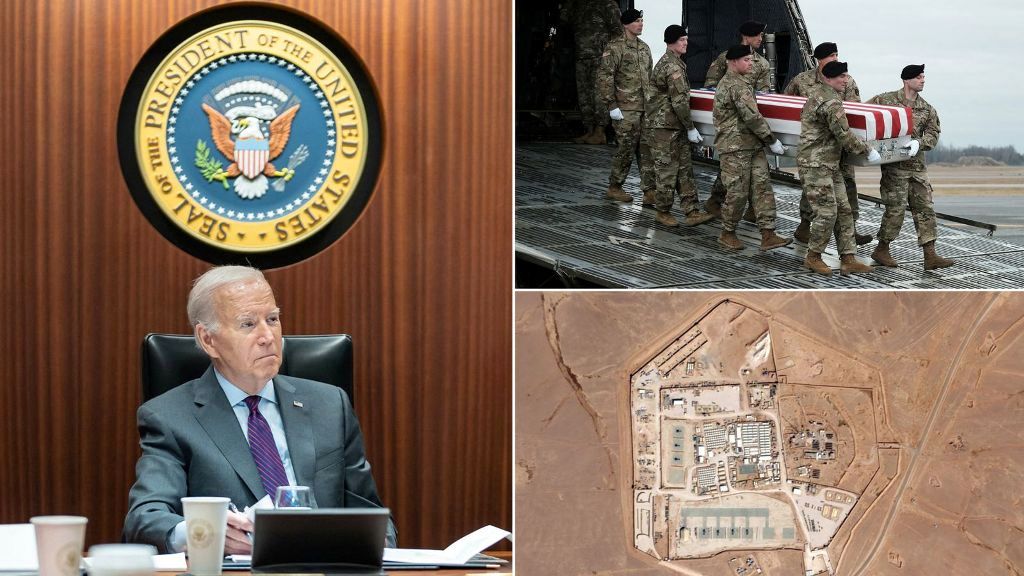
President Joe Biden ordered 85 attacks on Iran-supported groups in Iraq and Syria on Friday. He did this because three American soldiers died last weekend from these groups. He did not want to attack Iran directly, because that could start a bigger war. But he also wanted to do more than what the US has done before against these groups that make trouble in the region.
The US government does not think that Biden’s attacks will stop all the Iran-supported groups. These groups have been attacking US bases and ships in the Red Sea. Biden wants to find a better solution, but it is hard. He also wants to make a big deal with Iran and other countries that could change the region. He is also getting ready for another election next year.
The US does not know if the 125 smart bombs that they used on Friday night will stop more attacks on Americans.
The US hopes that by destroying the places where the Iran-supported groups work, keep their weapons, and plan their attacks, the US can make them weaker and tell them that they cannot attack without consequences.
“I think this is a good way to scare them,” said Sen. Tammy Duckworth, a Democrat from Illinois who fought in the Iraq War. “We are saying: We don’t want to fight. But you should see what we can do. Here you go. Eighty-five targets. And I think that this is how we need to deal with this situation right now.”
The US is not done yet, and they might do other things that we cannot see, like hacking, to make Iran and its groups weaker. The White House said before the attacks that they will do more things, and they will decide when and where based on what happens.
What happens next will affect the region and the president a lot. Before the US planes started attacking, Biden was with the families of the three Americans who died in Jordan.
Biden left the base in Delaware about an hour before the US attacks
Biden left the base in Delaware about an hour before the US attacks started in Iraq and Syria. This was not planned, but it showed how serious his decision was.
“Our attacks started today. They will go on when and where we want,” Biden said in a statement. “The US does not want trouble in the Middle East or anywhere else. But anyone who wants to hurt us should know this: If you hurt an American, we will hit back.”
Right after the US people in Washington heard that Tower 22 in Jordan was attacked last weekend — and that three American soldiers died because of it — Biden got some choices on Sunday for how to hit back, and he picked one, sources said.
Biden’s Respond to Iran-Backed Drone Attack
Biden met with his top security advisers on Monday morning in the White House Situation Room, where he approved the first round of US airstrikes on 85 targets in Iraq and Syria. He also learned that the US intelligence had blamed the Islamic Revolutionary Guard Corps (IRGC) and its allied groups for the drone attack on Sunday.
Biden faced different risks with each option he considered. If he hit too hard, he could provoke a serious escalation from Iran and its proxies, who have been attacking US bases and ships in the region since the Gaza war began in October. If he hit too soft, he could send a signal of weakness to the group that killed the US soldiers and to the American public.
“It’s both a science and an art,” said former Defense Secretary Mark Esper, who had similar discussions with former President Donald Trump. He said the officials had to weigh the factors such as the complexity of the attack, the expected damage, the casualties, and the possible retaliation.
“That’s a discussion that goes on within the room: what will the impact be? What will we expect from the Iranians?” Esper said. “It’ll be important to see what happens when the sun comes up tomorrow morning in Iraq and Syria.”
Biden and his advisers agreed that the US response had to be different from the previous exchanges of fire with the Iran-backed groups. They had many options to choose from, as the US had prepared plans to target the groups that cause trouble in the region. Biden announced his decision on Tuesday, two days after he promised to respond in South Carolina.
The weather in the region was the main factor that decided when the strikes would happen, the officials said later. Clear skies on Friday meant less chance of hitting the wrong targets or hurting civilians.
The question that remains is whether the US strikes will have any effect on Iran, which the US accuses of supporting and arming the groups that killed the US soldiers.
The US officials said they had seen signs that Iran was worried about some of the actions of its proxy groups in Iraq, Syria and Yemen, according to multiple sources familiar with the US intelligence. However, it’s becoming clear that Washington isn’t seeking a war with Iran – just as Iran insists it is not looking for a broader conflict.





